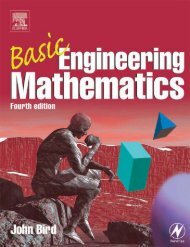- Page 3 and 4:
Begin Reading Table of Contents New
- Page 5 and 6:
A MESSAGE FROM MR. YOGA The ultimat
- Page 7 and 8:
Tantra a very sexual reputation. Th
- Page 9 and 10:
THE EIGHT LIMBS OF YOGA The Yoga Su
- Page 11 and 12:
The second limb helps refine your s
- Page 13 and 14:
hear, touch, and taste. Pratyahara
- Page 15 and 16:
THE UJJAYI BREATH Breath is an esse
- Page 17 and 18:
THE DRISHTIS Drishtis are the medit
- Page 19 and 20:
RELAXATION AND MEDITATION Relaxatio
- Page 21 and 22:
A BRIEF SUMMARY OF CHAKRAS
- Page 23 and 24:
By combining the two methods above,
- Page 25 and 26:
CONDITION 2. Carpal Tunnel To help
- Page 27 and 28:
and that are demanding on the cardi
- Page 29 and 30:
Arm balances with both feet off the
- Page 31 and 32:
your internal organs and may be dam
- Page 33 and 34:
Standing Poses MOUNTAIN POSE SIDE B
- Page 35 and 36:
Viparita Namaskar Tadasana (vi-puh-
- Page 37 and 38:
(tuh-DAHS-uh-nuh OORD-vuh BUH-duh h
- Page 39 and 40:
Drishti Point: Nasagrai or Nasagre
- Page 41 and 42:
TANDAVA AND LASYA DANCE MODIFICATIO
- Page 43:
SIDE BENDS: ONE ARM UP OVER THE HEA
- Page 47 and 48:
Utthita Stiti Bhujangasana (UT-ti-t
- Page 49 and 50:
Drishti Point: Bhrumadhye or Ajna C
- Page 51 and 52:
Drishti Point: Nasagrai or Nasagre
- Page 53 and 54:
Half Bound Unsupported Bound One-Le
- Page 55 and 56:
Pose Dedicated to Yogi Gitananda Gi
- Page 57 and 58:
ONE LEG STANDING BALANCE: KNEE BENT
- Page 59 and 60:
Pose Type: standing one-legged bala
- Page 63 and 64:
Open Heart Lord of the Dance Pose A
- Page 65 and 66:
Bound Lord of the Dance Pose Baddha
- Page 67 and 68:
Unsupported Sideways Hand to Knee L
- Page 69 and 70:
Standing Rising Wind Relieving Pose
- Page 71 and 72:
ONE LEG STANDING BALANCE: BOTH KNEE
- Page 73 and 74:
Tip Toe Pose Inspired by Parvati’
- Page 75 and 76:
Drishti Point: Hastagrai or Hastagr
- Page 77 and 78:
Modification: arm up over the head
- Page 79 and 80:
Hand to Foot One-Legged Half Intens
- Page 81 and 82:
ONE LEG STANDING BALANCE: BOTH KNEE
- Page 83 and 84:
Pose Inspired by Shiva’s Vigorous
- Page 85 and 86:
Reverse Prayer Tree Pose Viparita N
- Page 87 and 88:
ONE LEG STANDING BALANCE: KNEE BENT
- Page 91 and 92:
Hand Position of Cow Face Pose in T
- Page 93 and 94:
Hand to Foot Hand to Knee Tree Pose
- Page 95 and 96:
Extended One Foot Pose Utthita Ekap
- Page 97 and 98:
Also Known As: Leg to the Side Pose
- Page 99 and 100:
ONE LEG STANDING BALANCE: LEG STRAI
- Page 101 and 102:
Revolved Bird of Paradise Pose Pari
- Page 103 and 104:
ONE LEG STANDING BALANCE: BOTH LEGS
- Page 105 and 106:
Bound Unsupported One Leg Stretched
- Page 107 and 108:
ONE LEG STANDING BALANCE: STANDING
- Page 109 and 110:
Half One Leg Stretched Upward Pose
- Page 111 and 112:
Virabhadrasana 3 (VEER-uh buh-DRAHS
- Page 114:
ONE LEG STANDING BALANCE: ONE LEG S
- Page 118 and 119:
Parivritta Baddha Ardha Chandrasana
- Page 120 and 121:
(Ardha Padma Ardha Uttanasana), Hal
- Page 122 and 123:
Viparita Anahata Chakra Mudra in Pa
- Page 124 and 125:
Drishti Point: Nasagrai or Nasagre
- Page 126 and 127:
Revolved One Hand to Foot Half Stan
- Page 128 and 129:
ONE-LEGGED SQUATS: TWISTS—GRABBIN
- Page 130 and 131:
One-Legged Fierce Pose 2 Eka Pada U
- Page 132 and 133:
Modification: hips low Pose Type: s
- Page 134 and 135:
(HUH-stuh guh-ru-DAHS-uh-nuh in PAH
- Page 136 and 137:
Viparita Namaskar Parivritta Visham
- Page 138 and 139:
Half Foot Big Toe Pose Ardha Padang
- Page 140 and 141:
STANDING FULL FORWARD BEND: BALLET
- Page 142 and 143:
STANDING FULL FORWARD BEND: HANDS T
- Page 144 and 145:
Drishti Point: Nasagrai or Nasagre
- Page 146 and 147:
STANDING FULL FORWARD BEND: UNSUPPO
- Page 148 and 149:
STANDING FULL FORWARD BEND: TWISTS
- Page 150 and 151:
Revolved Intense Stretch Parivritta
- Page 152 and 153:
Complete Firefly Pose 2 Paripurna T
- Page 154 and 155:
Firefly Pose 4 B Tittibhasana 4 B (
- Page 156 and 157:
Feet Spread Mountain Pose in Hero S
- Page 158 and 159:
Book Stand Pose with Upward Bound H
- Page 160 and 161:
Hand Position of the Pose Dedicated
- Page 162 and 163:
Kalyasana (kahl-YAHS-uh-nuh) Modifi
- Page 164 and 165:
Pose Type: standing, forward bend,
- Page 166 and 167:
KALI SQUAT: HEELS UP—ARM POSITION
- Page 168 and 169:
KALI SQUAT: HEELS UP—SIDE BENDS S
- Page 170 and 171:
Tip Toe Pose Dedicated to Goddess K
- Page 172 and 173:
KALI SQUAT: HEELS UP—BINDING Tip
- Page 174 and 175:
ack of the hands to the floor, fing
- Page 176 and 177:
Drishti Point: Hastagrai or Hastagr
- Page 178 and 179:
Pose Type: standing, forward bend D
- Page 180 and 181:
Pose Type: standing, forward bend,
- Page 182 and 183:
Revolved Feet Spread Out Intense St
- Page 184:
DOWNWARD DOG Downward Facing Dog Po
- Page 188 and 189:
Downward Facing Dog Pose Adho Mukha
- Page 190 and 191:
Leg Position of the Half Cow Face P
- Page 192 and 193:
Hasta Kulpa Eka Pada Adho Mukha Shv
- Page 194 and 195:
Modification: back leg straight and
- Page 196 and 197:
Drishti Point: Bhrumadhye or Ajna C
- Page 198 and 199:
Intense Side Stretch Pose Prep. Par
- Page 200 and 201:
Intense Side Stretch Pose Parshvott
- Page 202 and 203:
INTENSE SIDE STRETCH: FULL FORWARD
- Page 204 and 205:
INTENSE SIDE STRETCH: FULL FORWARD
- Page 206:
TRIANGLE POSE Extended Triangle Pos
- Page 210 and 211:
Baddha Utthita Trikonasana (BUH-duh
- Page 213:
WARRIOR 2 & SIDE ANGLE POSE Extende
- Page 217 and 218:
Both Arms Extended Side Angle Pose
- Page 219 and 220:
Ardha Baddha Utthita Parshva Konasa
- Page 221 and 222:
SIDE ANGLE POSE: REVOLVED Revolved
- Page 223 and 224:
Revolved Side Angle Pose Prep. Pari
- Page 225 and 226:
REVERSE WARRIOR Both Arms Extended
- Page 227 and 228:
Prapada Viparita Virabhadrasana (PR
- Page 229 and 230:
(Vira Parampara) Pose Type: standin
- Page 231 and 232:
Raised Bound Hands in Warrior 1 Urd
- Page 233 and 234:
WARRIOR 1: FORWARD BEND—ARMS BEHI
- Page 235 and 236:
Bowing Hands Bound Warrior Pose Nam
- Page 237 and 238:
LUNGE: BACK KNEE ON THE FLOOR Eques
- Page 239 and 240:
Drishti Point: Nasagrai or Nasagre
- Page 241 and 242:
Hands Spread Out Extended Lizard Ta
- Page 243 and 244:
Son of Anjani (Lord Hanuman) Lunge
- Page 245 and 246:
Standing Pose of the Heavenly Spiri
- Page 247 and 248:
Tip Toe Sideways Son of Anjani (Lor
- Page 249 and 250:
Yudhasana 1 (yu-DAHS-uh-nuh) Pose T
- Page 251 and 252:
One Foot Behind the Head Extended L
- Page 253 and 254:
Tip Toe Both Hands to Foot Son of A
- Page 255 and 256:
Bound Revolved Side Angle Pose Prep
- Page 257 and 258:
One Hand in Prayer Revolved One-Leg
- Page 259 and 260:
Both Hands Bound Revolved Spear Pos
- Page 261 and 262:
Hands Bound Ankle Stretch Pose Badd
- Page 263 and 264:
Tip Toe One-Legged King Pigeon Pose
- Page 265 and 266:
LUNGE: BACK KNEE ON FLOOR—ONE-LEG
- Page 267 and 268:
LUNGE: BACK KNEE ON FLOOR—ONE-LEG
- Page 269 and 270:
LUNGE: BACK KNEE ON FLOOR—ONE-LEG
- Page 271:
LUNGE: FRONT LEG STRAIGHT—BACKBEN
- Page 276 and 277:
Gate Pose Parighasana (puh-ri-GAHS-
- Page 278 and 279:
Gate Pose Parighasana (puh-ri-GAHS-
- Page 280 and 281:
Revolved Gate Pose Parivritta Parig
- Page 282 and 283:
Half Bound Half Pose Dedicated to L
- Page 284 and 285:
Half Lotus Extended Lizard Tail Lun
- Page 286 and 287:
HORSE POSE: SPINE STRAIGHT Half Bou
- Page 288 and 289:
Mermaid Arm Position in Half Camel
- Page 290 and 291:
Leg Position of Cow Face Pose on th
- Page 292:
Son of Anjani (Lord Hanuman) Lunge
- Page 296 and 297:
Reverse Prayer Son of Anjani (Lord
- Page 298 and 299:
One Hand Rising Standing Pose of th
- Page 300 and 301:
Extended Lizard Tail Lunge Pose Utt
- Page 302 and 303:
Revolved Son of Anjani (Lord Hanuma
- Page 304 and 305:
Prapada Parshva Anjaneyasana (PRUH-
- Page 306 and 307:
Utthita Parshva Pada Upaveshasana (
- Page 308 and 309:
Utthita Parshva Pada Upaveshasana (
- Page 310 and 311:
Pose Type: standing, seated, forwar
- Page 312 and 313:
Revolved Half Bound Extended Leg to
- Page 314 and 315:
Extended Leg to the Side Tip Toe Sq
- Page 316 and 317:
SIDE LUNGE: SITTING BONE TO THE HEE
- Page 318 and 319:
2. knee off the floor Pose Type: st
- Page 320:
Intense Wrist Stretch Fierce Pose U
- Page 324 and 325:
CHAIR SQUAT: HIGH STANCE—HANDS IN
- Page 326 and 327:
Intense Wrist Stretch Revolved Half
- Page 328 and 329:
Revolved Fierce Pose Parivritta Utk
- Page 330 and 331:
Revolved One Leg Bound Fierce Pose
- Page 332 and 333:
CHAIR SQUAT: HIGH STANCE HEELS UP
- Page 334 and 335:
Head to Knees Tip Toe Fierce Pose 2
- Page 336 and 337:
Unsupported Tip Toe Wagtail Pose 2
- Page 338 and 339:
Intense Ankle Stretch Tip Toe Fierc
- Page 340 and 341:
Pendant Pose Prep. Lolasana Prep. (
- Page 342 and 343:
Revolved Easy Leg Position of the P
- Page 344 and 345:
Hand Position of the Pose Dedicated
- Page 346 and 347:
Hands Bound Tip Toe Pose Baddha Has
- Page 348 and 349:
SQUAT: HEELS UP—KNEES TOGETHER—
- Page 350 and 351:
Supported Seated Tip Toe Pose Salam
- Page 352 and 353:
Extended Side Tip Toe Noose Pose Ut
- Page 354 and 355:
Prapada Pashasana Prep. (PRUH-puh-d
- Page 356 and 357:
Garland Pose Prep. Malasana Prep. (
- Page 358 and 359:
Extended Side Noose Pose Utthita Pa
- Page 360 and 361:
Noose Pose Pashasana (puh-SHAHS-uh-
- Page 362 and 363:
One-Legged Tip Toe Pose Eka Pada Pr
- Page 364 and 365:
ONE-LEGGED SQUAT: FOOT UNDER THE KN
- Page 366 and 367:
Supported One-Legged Tip Toe Pose S
- Page 368 and 369:
ONE-LEGGED SQUAT: HALF LOTUS—HEEL
- Page 370 and 371:
Drishti Point: Nasagrai or Nasagre
- Page 372 and 373:
ONE-LEGGED SQUAT: ONE LEG STRAIGHT
- Page 374 and 375:
One Foot Behind the Head Tip Toe Po
- Page 376 and 377:
Bound Garland Pose Baddha Malasana
- Page 378 and 379:
Drishti Point: Hastagrai or Hastagr
- Page 380 and 381:
Garland Pose Malasana (mah-LAHS-uh-
- Page 382 and 383:
Garland Pose Malasana (mah-LAHS-uh-
- Page 385:
SQUAT: HEELS UP—KNEES WIDE, FORWA
- Page 389 and 390:
SQUAT: HEELS UP—KNEES WIDE, ARMS
- Page 391 and 392:
Unsupported Intense Ankle Stretch T
- Page 393 and 394:
One Hand in Reverse Prayer Tip Toe
- Page 395 and 396:
Root Lock Pose Prep. Mulabhandasana
- Page 397 and 398:
Pose Dedicated to Sage Vamadeva 1 V
- Page 399:
EASY POSE: KNEES HIGH Easy Pose Suk
- Page 402 and 403:
Sukhasana (suk-AHS-uh-nuh) Modifica
- Page 404 and 405:
Pose Type: seated, forward bend, co
- Page 406 and 407:
ACCOMPLISHED ONE POSE Accomplished
- Page 408 and 409:
Drishti Point: Urdhva or Antara Dri
- Page 410 and 411:
Half Lotus Pose Ardha Padmasana (UH
- Page 412 and 413:
Lotus Pose Padmasana (puhd-MAHS-uh-
- Page 414 and 415:
Bound Lotus Pose Baddha Padmasana (
- Page 416 and 417:
Simple Yoga Seal Laghu Yoga Mudra (
- Page 418 and 419:
Revolved Lotus Pose Parivritta Padm
- Page 420 and 421:
Pose Dedicated to Siddhar Vaasamuni
- Page 422 and 423:
Yogic Seal Pose Prep. Yoga Mudrasan
- Page 424 and 425:
LOTUS POSE: EMBRYO IN THE WOMB POSE
- Page 426 and 427:
Revolved Pose Dedicated to Sage Mar
- Page 428 and 429:
Revolved Half Pose Dedicated to Sag
- Page 430 and 431:
Seated Noose Pose Prep. Upavishta P
- Page 432:
BOTH KNEES BENT: BACKBEND, SIDE BEN
- Page 436 and 437:
Half Lord of the Fishes Pose Ardha
- Page 438 and 439:
BOTH KNEES BENT: BINDING & TWIST Po
- Page 440 and 441:
Half Lord of the Fishes Pose 1 Prep
- Page 442 and 443:
Pose Dedicated to Sage Marichi 3 Ma
- Page 444 and 445:
FOOT TO THE BACK: TWISTS—KNEE BEN
- Page 446 and 447:
Pose Dedicated to Sage Marichi 6 Pr
- Page 448 and 449:
BOUND ANGLE POSE: ARMS BEHIND Bound
- Page 450 and 451:
BOUND ANGLE POSE: SIDE BEND & BINDI
- Page 452 and 453:
Equilibrium Bound Angle Pose 1 Tuly
- Page 454 and 455:
Bound Angle Pose Baddha Konasana (B
- Page 456 and 457:
Easy Embryo in the Womb Pose Sukha
- Page 458 and 459:
One Hand Seated Eastern Intense Str
- Page 460 and 461:
Tortoise Pose Prep. Kurmasana Prep.
- Page 462 and 463:
Modification: shoulders to the back
- Page 464 and 465:
Also Known As: Urdhva Upavistha Kon
- Page 466 and 467:
Hands to Feet Upward Seated Angle P
- Page 468 and 469:
Equal Angle Pose Samakonasana (suh-
- Page 470 and 471:
Equal Angle Pose Samakonasana (suh-
- Page 472 and 473:
Modification: mild version, backben
- Page 474 and 475:
Bound Equal Angle Pose Baddha Samak
- Page 476 and 477:
Revolved Bound Equal Angle Pose Par
- Page 478 and 479:
Reverse Prayer Staff Pose Viparita
- Page 480 and 481:
Western Intense Stretch Pose Paschi
- Page 482 and 483:
Viparita Namaskar Paschimottanasana
- Page 484 and 485:
LEGS STRAIGHT: ON THE SIDE & SCISSO
- Page 486 and 487:
Bound Leg Archer’s Pose Baddha Pa
- Page 488 and 489:
Pose Dedicated to Skanda Skandasana
- Page 490 and 491:
Marichyasana 1 & 2 Prep. (muh-ree-C
- Page 492 and 493:
Pose Dedicated to Sage Marichi 2 Pr
- Page 494 and 495:
Seated Revolved Upward One Hand to
- Page 496 and 497:
Infinity Pose Parivritta Paschimott
- Page 498 and 499:
Half Cow Face Western Intense Stret
- Page 500 and 501:
Urdhva Ardha Gomukha Paschimottanas
- Page 502 and 503:
Urdhva Baddha Hasta Surya Yantrasan
- Page 504 and 505:
ONE LEG STRAIGHT, ONE LEG BENT: HAL
- Page 506 and 507:
Half Lotus Extended Revolved Hand t
- Page 508 and 509:
ONE LEG STRAIGHT, ONE KNEE BENT TO
- Page 510 and 511:
Gate Pose Parighasana (puh-ri-GAHS-
- Page 512 and 513:
Reclined Half Hero Extended Hand to
- Page 514 and 515:
GARUDA LEGS: BACKBEND, TWIST, FORWA
- Page 516 and 517:
Bound Revolved Seated Leg Position
- Page 518 and 519:
Sideways Twist Dedicated to Sage Bh
- Page 520 and 521:
HEAD TO KNEE POSE: FORWARD BEND Hea
- Page 522 and 523:
Head to Knee Pose C Prep. Janu Shir
- Page 524 and 525:
Revolved Sideways Half Bound Angle
- Page 526:
Sideways Head to Knee Pose Parshva
- Page 530 and 531:
Half Bound Sideways Head to Knee Po
- Page 532 and 533:
HEAD TO KNEE POSE: LEG LIFTED Hands
- Page 534 and 535:
Prapada Virasana (PRUH-puh-duh veer
- Page 536 and 537:
Lion Pose Dedicated to an Avatar of
- Page 538 and 539:
2. spine straight Pose Type: 1. sea
- Page 540 and 541:
Both Hands to Feet Hero Pose Dwi Ha
- Page 542 and 543:
Revolved Hero Pose Parivritta Viras
- Page 544 and 545:
THUNDERBOLT POSE: SITTING BONES ON
- Page 546 and 547:
Revolved Complete Thunderbolt Pose
- Page 548 and 549:
Ardha Baddha Marichyasana in Ardha
- Page 550 and 551:
One Hand Sideways Complete Thunderb
- Page 552 and 553:
Pose Dedicated to Virancha (Brahma)
- Page 554 and 555:
ONE KNEE BENT TO THE BACK: OTHER FO
- Page 556:
ONE KNEE BENT TO THE BACK: HALF LOT
- Page 560 and 561:
Pose Dedicated to Sage Bharadvaja 2
- Page 562 and 563:
One-Legged King Pigeon Pose 3 Eka P
- Page 564 and 565:
Yogic Staff Pose Prep. Yogadandasan
- Page 566 and 567:
Four Corner Pose Chatushkonasana (c
- Page 568 and 569:
Half Bound Fire Log Pose in Half Yo
- Page 570 and 571:
ONE LEG OVER THE SHOULDER: BOTH KNE
- Page 572 and 573:
Pose Dedicated to Virancha (Brahma)
- Page 574 and 575:
Cow Face Pose Gomukhasana (go-mu-KA
- Page 576 and 577:
(Dighasrngasana) Pose Type: seated,
- Page 578 and 579:
Hand to Foot Revolved Leg Position
- Page 580 and 581:
COW FACE POSE: ELBOW & FOREARM ON T
- Page 582 and 583:
Pose Dedicated to Sage Vamadeva Vam
- Page 584 and 585:
ONE-LEGGED KING PIGEON: HIPS OFF TH
- Page 586 and 587:
One-Legged King Pigeon Pose 1 Prep.
- Page 588 and 589:
Revolved One-Legged King Pigeon Pos
- Page 590 and 591:
One-Legged King Pigeon Pose 1 Eka P
- Page 592 and 593:
ONE-LEGGED KING PIGEON: ASYMMETRICA
- Page 594 and 595:
ONE-LEGGED KING PIGEON: FOOT TO THE
- Page 598 and 599:
ONE-LEGGED KING PIGEON: BACK LEG ST
- Page 600 and 601:
Eka Pada Raja Kapotasana 1 (EY-kuh
- Page 602:
VERTICAL SPLITS: SPINE STRAIGHT Pos
- Page 607 and 608:
Hands Bound Pose Dedicated to Hanum
- Page 609 and 610:
VERTICAL SPLITS: BACK FOOT TOWARD T
- Page 611 and 612:
One-Legged King Pigeon Pose 4 Eka P
- Page 613 and 614:
Core Poses BOAT POSE SIX TRIANGLES
- Page 615 and 616:
Sukha Navasana (SUK-uh nah-VAHS-uh-
- Page 617:
BOAT POSE: BOTH KNEES BENT Boat Pos
- Page 620 and 621:
Sukha Navasana (SUK-uh nah-VAHS-uh-
- Page 622 and 623:
Supported Boat Pose Salamba Navasan
- Page 624 and 625:
Boat Pose Navasana (nah-VAHS-uh-nuh
- Page 626 and 627:
Revolved Supported Boat Pose—One-
- Page 628 and 629:
Revolved Boat Pose Parivritta Navas
- Page 630 and 631:
One-Legged Unsupported Boat Pose Ek
- Page 632 and 633:
Baby Cradle Pose in Boat Pose Hindo
- Page 634 and 635:
the side Pose Type: core, seated, t
- Page 636 and 637:
2. grabbing onto the foot, nose to
- Page 638 and 639:
Upward Facing Supported Western Int
- Page 640 and 641:
Upward Facing Western Intense Stret
- Page 642 and 643:
SUPINE: ONE LEG STRAIGHT, ONE LEG B
- Page 644 and 645:
SUPINE: BOTH LEGS STRAIGHT Abdomina
- Page 646 and 647:
SUPINE: BOTH LEGS STRAIGHT Two-Legg
- Page 648 and 649:
SUPINE: GARUDA LEGS ON THE BACK Rec
- Page 650 and 651:
SUPINE: FULL LOTUS Reclining Abdomi
- Page 652 and 653:
Unsupported Abdominal Lift Lotus Po
- Page 654 and 655:
CHILD’S POSE Child’s Pose Balas
- Page 656 and 657:
(HUH-stuh guh-ru-DAHS-uh-nuh in bah
- Page 658 and 659:
Revolved Child’s Pose Parivritta
- Page 660 and 661:
Half Bound Lotus Revolved Child’s
- Page 662 and 663:
Revolved Half Bow Pose in Equilibri
- Page 664:
RABBIT POSE Hands Bound Rabbit Pose
- Page 668 and 669:
Reverse Prayer in Leg Position of t
- Page 670 and 671:
Intense Wrist Stretch Cow Pose Utta
- Page 672 and 673:
ALL FOURS: NEUTRAL SPINE—ONE LEG
- Page 674 and 675:
ALL FOURS: NEUTRAL SPINE—ONE LEG
- Page 676 and 677:
Tiger Pose Vyaghrasana (vyah-GRAHS-
- Page 678 and 679:
Tiger Pose Vyaghrasana (vyah-GRAHS-
- Page 680 and 681:
Unsupported Tiger Pose Niralamba Vy
- Page 682 and 683:
ALL FOURS: FOREARMS Cow Pose Bitila
- Page 684 and 685:
Supported Tiger Pose Salamba Vyaghr
- Page 686 and 687:
Revolved Half Lotus Cow Pose Parivr
- Page 688 and 689:
PLANK POSE: ON THE FINGERTIPS & ARM
- Page 690 and 691:
One-Legged Extended Four Limbs Staf
- Page 692 and 693:
PLANK POSE: ARM AND LEG MODIFICATIO
- Page 694 and 695:
Tree Pose in One-Legged Extended Fo
- Page 696 and 697:
Drishti Point: Angushtamadhye or An
- Page 698 and 699:
PLANK POSE: ONE LEG TO THE SIDE Leg
- Page 700 and 701:
One Hand Staff Pose Dedicated to Ma
- Page 702 and 703:
Pose Pada Eka Pada Raja Kapotasana
- Page 704 and 705:
Hand to the Leg Sideways Uneven Leg
- Page 706 and 707:
One Hand Four Limbed Staff Pose Eka
- Page 708 and 709:
FOUR LIMBED STAFF POSE: KNEES OFF T
- Page 710 and 711:
FOUR LIMBED STAFF POSE: KNEE TO THE
- Page 712 and 713:
One Hand to the Side Four Limbed St
- Page 714 and 715:
Vajra Chaturanga Dandasana (VAHJ-ru
- Page 716 and 717:
Hands Spread Wide Four Limbed Staff
- Page 718 and 719:
Pose Dedicated to Sage Vasishta Vas
- Page 720 and 721:
SIDE PLANK: BOTTOM LEG OFF THE FLOO
- Page 722 and 723:
Modification: top foot to the inner
- Page 724 and 725:
Pose Dedicated to Vishvamitra Vishv
- Page 726 and 727:
Pose Dedicated to Shiva the Destroy
- Page 728 and 729:
SIDE PLANK ON FOREARMS: KNEES OFF T
- Page 730 and 731:
Vasishtasana (vuh-sish-TAHS-uh-nuh)
- Page 732 and 733:
Half Lotus Pose in Pose Dedicated t
- Page 734 and 735:
SIDE PLANK ON FOREARMS: BOTTOM LEG
- Page 736 and 737:
SIDE PLANK ON FOREARMS: HALF LOTUS
- Page 738 and 739:
Lotus Pose in Pose Dedicated to Sag
- Page 740 and 741:
Half Lotus Pose in Pose Dedicated t
- Page 742 and 743:
COW FACE POSE AND GARUDA ON THE KNE
- Page 744 and 745:
One-Legged Camel Pose Eka Pada Usht
- Page 746 and 747:
Upward Salute Pose in Camel Pose Ur
- Page 748 and 749:
Pose Dedicated to King Nahusha Nahu
- Page 750 and 751:
(UHR-duh oosh-TRAHS-uh-nuh) Modific
- Page 752 and 753:
ONE KNEE BENT TOWARD THE HIP: BACKB
- Page 754 and 755:
Bed Pose Paryankasana (puhr-yuhng-K
- Page 756 and 757:
BACKBEND ON THE KNEES AND HEAD: PIG
- Page 758 and 759:
PIGEON POSE: ONE-LEGGED One-Legged
- Page 760 and 761:
(EY-kuh PUH-duh kuh-po-TAHS-uh-nuh)
- Page 762 and 763:
TOES CURLED IN: BACKBEND—HANDS TO
- Page 764 and 765:
Half Tip Toe Camel Pose Ardha Prapa
- Page 766 and 767:
Tip Toe Pigeon Pose Prapada Kapotas
- Page 768 and 769:
BACKBEND: HEADSTAND 5 ARM POSITION
- Page 770 and 771:
Urdhva Dhanurasana in Shirshasana 1
- Page 772 and 773:
BACKBEND: FOREARMS ON THE FLOOR, BO
- Page 774 and 775:
BACKBEND: FOREARMS ON THE FLOOR, HE
- Page 776 and 777:
Baddha Pada Eka Pada Viparita Danda
- Page 778:
out of the pose. Modification: fore
- Page 781 and 782:
Tip Toe Upward Bow Pose Prapada Urd
- Page 783 and 784:
Drishti Point: Bhrumadhye or Ajna C
- Page 785 and 786:
Wild Thing Pose Chamatkarasana (kuh
- Page 787 and 788:
ARM BALANCE: SITTING BONES & FEET O
- Page 789 and 790:
Modification: 1. fingertips pointin
- Page 791 and 792:
Side Rooster Pose Parshva Kukkutasa
- Page 793:
ARM BALANCE: PENDANT POSE Pendant P
- Page 796 and 797:
ARM BALANCE: ONE LEG OVER THE SHOUL
- Page 798 and 799:
Crane Pose Bakasana (buh-KAHS-uh-nu
- Page 800 and 801:
Firefly Pose 1 Tittibhasana 1 (ti-t
- Page 802 and 803:
Pose Type: arm balance, forward ben
- Page 804 and 805:
One-Legged Crane 2 Eka Pada Bakasan
- Page 806 and 807:
Drishti Point: Angushtamadhye or An
- Page 808 and 809:
(nose) ARM BALANCE: GARUDA LEGS Rev
- Page 810 and 811:
ARM BALANCE: BOTH LEGS TO THE SIDE
- Page 812 and 813:
Vishama Ashtavakrasana (VISH-uh-muh
- Page 814 and 815:
Uneven Arms Side Crane Pose Vishama
- Page 816 and 817:
ARM BALANCE: PEACOCK AND SWAN Peaco
- Page 818 and 819:
Inversion Poses DUCK POSE DOLPHIN P
- Page 820 and 821:
DOLPHIN POSE Downward Facing Pose D
- Page 822 and 823:
Picha Mayurasana (pich-chuh muh-yoo
- Page 824 and 825:
One-Legged Scorpion Pose Eka Pada V
- Page 826 and 827:
Upward Lotus Pose in Peacock Feathe
- Page 828 and 829:
One-Legged Downward Facing Tree Pos
- Page 830:
HANDSTAND, LEG CROSSED OVER: GARUDA
- Page 833 and 834:
Pada Svastikasana in Adho Mukha Vri
- Page 835 and 836:
Urdhva Padmasana in Adho Mukha Vrik
- Page 837 and 838:
Upward Staff Pose in Headstand 1 Ur
- Page 839 and 840:
Bound Angle Pose in Headstand 1 Bad
- Page 841 and 842:
Leg Position of the Pose Dedicated
- Page 843 and 844:
Modification: thighs parallel to th
- Page 845 and 846:
Sideways Uneven Upward Staff Pose P
- Page 847 and 848:
Pada Gomukhasana in Shirshasana 5 (
- Page 849 and 850:
Revolved Leg Position of One-Legged
- Page 851 and 852:
Parshva Bakasana in Shirshasana 5 (
- Page 853 and 854:
Modification: Side 1: arm bent at 9
- Page 855 and 856:
Crane Pose in Uneven Headstand (Fus
- Page 857 and 858:
Bound Angle Pose in Headstand 7B Ba
- Page 859 and 860:
Pose Type: inversion, forward bend,
- Page 861 and 862:
Pose Type: inversion, forward bend
- Page 863 and 864:
SHOULDERSTAND: BOTH LEGS STRAIGHT
- Page 865 and 866:
SHOULDERSTAND: ONE LEG UP, ONE LEG
- Page 867 and 868:
Extended Hand to Big Toe Pose in Un
- Page 869 and 870:
Leg Position of the Pose Dedicated
- Page 871 and 872:
Upward Lotus in Whole Body Pose Urd
- Page 873 and 874:
Upward Lotus Pose in Whole Body Pos
- Page 875 and 876:
Parshva Pindasana in Sarvangasana (
- Page 877 and 878:
Ear Pressure Pose Prep. Karnapidasa
- Page 879 and 880:
Sideways Ear Pressure Pose Parshva
- Page 881 and 882:
Ear Pressure Pose Karnapidasana (ku
- Page 883 and 884:
Bound Hands Plow Pose Baddha Hasta
- Page 885 and 886:
Reclined Upward Foot Thunderbolt Po
- Page 887 and 888:
STOMACH ON THE FLOOR Pose Dedicated
- Page 889 and 890:
Utthan Sarpa Godhasana (ut-TAHN-uh
- Page 891 and 892:
Adho Mukha Jatara Parivartanasana (
- Page 893 and 894:
Pose Type: arm balance, forward ben
- Page 895 and 896:
Bound Downward Facing Pose Dedicate
- Page 897 and 898:
Drishti Point: Bhrumadhye or Ajna C
- Page 899 and 900:
Hands Bound Locust Pose Baddha Hast
- Page 901 and 902:
LOCUST POSE: ONE LEG Half Locust Po
- Page 903 and 904:
Mermaid Pose in Locust Pose Naginya
- Page 905 and 906:
SPHINX POSE: BOTH KNEES BENT Suppor
- Page 907 and 908:
Downward Facing Bound Angle Pose Ad
- Page 909 and 910:
Cobra Pose Bhujangasana (buj-uhng-G
- Page 911 and 912:
King Pigeon Pose Raja Kapotasana (R
- Page 914:
KING PIGEON POSE: GRABBING ONTO THE
- Page 918 and 919:
Feet to the Back King Pigeon Pose P
- Page 920 and 921:
UPWARD DOG POSE: BOTH LEGS STRAIGHT
- Page 922 and 923:
Upward Facing Dog Pose Urdhva Mukha
- Page 924 and 925:
Urdhva Mukha Shvanasana (OORD-vuh M
- Page 926 and 927:
Modification: grabbing onto the opp
- Page 928 and 929:
Also Known As: Supported Cobra Pose
- Page 930 and 931:
BOW POSE: UNDER-HEAD GRIP—BOTH KN
- Page 932 and 933:
Sideways Bow Pose Parshva Dhanurasa
- Page 935 and 936:
Little Bow Pose Laghu Dhanurasana (
- Page 937 and 938:
Pose Type: prone, backbend Drishti
- Page 939 and 940:
Both Hand One-Legged Big Toe Bow Po
- Page 941 and 942:
Bow Pose Dhanurasana (duh-nur-AHS-u
- Page 943 and 944:
Half Lotus Frog Pose Ardha Padma Bh
- Page 945 and 946:
Also Known As: Lion Pose (Simhasana
- Page 947 and 948:
Half Pose Dedicated to Sage Gherand
- Page 949 and 950:
SAGE GHERANDA’S POSE: OVERHEAD GR
- Page 951 and 952:
Pose Dedicated to Sage Gheranda 4 G
- Page 953 and 954:
(PUH-duh guh-ru-DAHS-uh-nuh in EY-k
- Page 955 and 956:
CHIN ON THE FLOOR & EAR ON THE FLOO
- Page 957 and 958:
Formidable Face Staff Pose Danda Ga
- Page 959 and 960:
Inverted Locust Pose Viparita Shala
- Page 961 and 962:
Pose Type: prone, backbend, inversi
- Page 963 and 964:
Intense Extended Puppy Dog Pose Utt
- Page 965 and 966:
Aranyasana Prep. (uh-rah-NYAHS-uh-n
- Page 967 and 968:
Half Lotus Intense Extended Puppy D
- Page 969 and 970:
Feet Spread Wide Pose in Inverted L
- Page 971 and 972:
Eight Limbs Pose Ashtangasana (uhsh
- Page 973 and 974:
CHEST AND KNEES ON THE FLOOR: KNEES
- Page 975 and 976:
Drishti Point: Bhrumadhye or Ajna C
- Page 977 and 978:
Half Bow Pose in One-Legged Water G
- Page 979 and 980:
Half Bow Pose in One-Legged Water G
- Page 981 and 982:
knees bent, knee of the top leg res
- Page 983 and 984:
Supine Poses SHOULDER ON THE FLOOR
- Page 985 and 986:
(PAHRSH-vuh VAH-yu muk-TYAHS-uh-nuh
- Page 987 and 988:
Pose Type: supine (on the side), tw
- Page 989 and 990:
SHOULDER ON THE FLOOR: FOOT TO THE
- Page 991 and 992:
SHOULDER ON THE FLOOR: FINGERS INTE
- Page 993 and 994:
Infinity Pose Anantasana (uhn-uhnt-
- Page 995 and 996:
TRICEPS ON THE FLOOR: BOTH KNEES BE
- Page 997 and 998:
Pose Type: supine (on the side), mi
- Page 999 and 1000:
TRICEPS ON THE FLOOR: HALF LOTUS &
- Page 1001 and 1002:
Infinity Pose Anantasana (uhn-uhnt-
- Page 1003 and 1004:
Leg Position of the Pose Dedicated
- Page 1005 and 1006:
Pose Type: supine (on the side), mi
- Page 1007 and 1008:
Half Eastern Intense Stretch Pose A
- Page 1009 and 1010:
EASTERN INTENSE STRETCH: KNEES BENT
- Page 1011 and 1012:
Pose Type: standing, backbend Drish
- Page 1013:
EASTERN INTENSE STRETCH: ONE LEG ST
- Page 1016 and 1017:
Drishti Point: Bhrumadhye or Ajna C
- Page 1018 and 1019:
Easy Fish Pose Sukha Matsyasana (SU
- Page 1020 and 1021:
Reverse Prayer One-Legged Easy Fish
- Page 1022 and 1023:
EASTERN INTENSE STRETCH: ELBOWS ON
- Page 1024 and 1025:
Reclined Hands Bound Twisted Stomac
- Page 1026 and 1027:
Uneven Bridge Whole Body Pose Visha
- Page 1028 and 1029:
Bridge Whole Body Pose Setu Bandha
- Page 1030 and 1031:
Hand to Ankle Bridge Whole Body Pos
- Page 1032 and 1033:
Half Bound Lotus One Hand to Ankle
- Page 1034:
One-Legged Bridge Whole Body Pose E
- Page 1037:
setu = bridge, dam or dike bandha =
- Page 1041 and 1042:
Prapada Setu Bandha Sarvangasana (P
- Page 1043 and 1044:
(VISH-uh-muh PUH-duh go-muk-AHS-uh-
- Page 1045 and 1046:
One-Legged Hands Bound Tip Toe Brid
- Page 1047 and 1048:
BRIDGE: LEGS STRAIGHT—BACK OF THE
- Page 1049 and 1050:
floor by the heels, elbows to the f
- Page 1051 and 1052:
Reverse Prayer Fish Pose Viparita N
- Page 1053 and 1054:
Half Bound Lotus Fish Pose Ardha Ba
- Page 1055 and 1056:
RECLINED BOUND ANGLE POSE & FISH PO
- Page 1057 and 1058: Reverse Prayer Intense Leg Stretch
- Page 1059 and 1060: Vajracchedika Prajnaparamita Sutra
- Page 1061 and 1062: 1. elbows to the floor 2. arms stra
- Page 1063 and 1064: Reclined Twisting Fire Log Pose Sup
- Page 1065 and 1066: (SUP-tuh PUH-duh go-muk-AHS-uh-nuh)
- Page 1067 and 1068: (SUP-tuh bah-LAHS-uh-nuh) Also Know
- Page 1069 and 1070: Supta Vrikshasana (SUP-tuh vrik-SHA
- Page 1071 and 1072: Sideways Reclining Leg Position of
- Page 1073 and 1074: HAPPY BABY POSE & ONE FOOT BEHIND T
- Page 1075 and 1076: Reclined One Hand to Foot One Leg B
- Page 1077 and 1078: Hands Bound Yogic Sleep Pose Baddha
- Page 1079 and 1080: Sideways Reclined Angle Pose Parshv
- Page 1081 and 1082: ONE KNEE BENT TO THE BACK, OTHER LE
- Page 1083 and 1084: One-Legged Reclined Hero Pose Eka P
- Page 1085 and 1086: Reclined One-Legged Thunderbolt Pos
- Page 1087 and 1088: Pose Type: supine Drishti Point: Bh
- Page 1089 and 1090: Padayoragre (toes/feet) Reclining H
- Page 1091 and 1092: the floor, toes flexed in Pose Type
- Page 1093 and 1094: Drishti Point: Nasagrai or Nasagre
- Page 1095 and 1096: Half Upward Facing Western Intense
- Page 1097 and 1098: (hands) Corpse Pose Shavasana (shuh
- Page 1099 and 1100: Aggie M. Susan M. Olga Q. B. Laura
- Page 1101 and 1102: Paula O. Venessa S. Additional spec
- Page 1103 and 1104: Erin B. Valeryia G. Michael C. Bren
- Page 1105 and 1106: Kellys E. Diana M. Alessandra F. Ne
- Page 1107: Rachel M. Hue N. Deanna D. Aggie M.
- Page 1111 and 1112: for the creation of the world, he i
- Page 1113 and 1114: garbha kosha = uterus garbha pinda
- Page 1115 and 1116: Kamala = Hindu Goddess of Wealth,
- Page 1117 and 1118: manipuraka = a nervous plexus situa
- Page 1119 and 1120: parigraha = hoarding, possessivenes
- Page 1121 and 1122: Sankarar = yogi from the eighth cen
- Page 1123 and 1124: tola = balance, scale tolana = weig
- Page 1125 and 1126: the self, derived from “yuj”, m
- Page 1127 and 1128: * “Ushtrasana” may also be spel
- Page 1129 and 1130: Thank you for buying this ebook, pu
- Page 1131: Copyright The information herein is







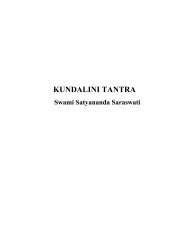
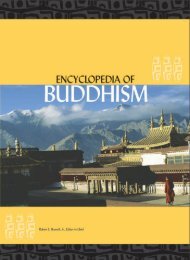
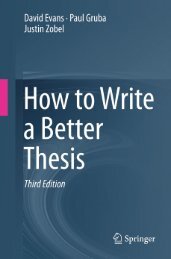
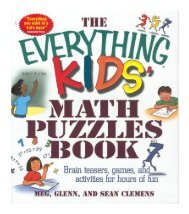

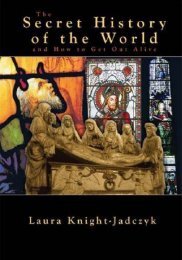

![[Lonely Planet] Sri Lanka](https://img.yumpu.com/59845622/1/169x260/lonely-planet-sri-lanka.jpg?quality=85)


